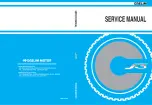
⑹
Install exhaust muffler. The M8 nut and the exhaust pipe sealing ring should be firmly installed, and the
tightening torque should be 25 ~ 30N•m. The exhaust port should not leak during the installation.
Engine maintenance and adjustment
Inspection of bolts and nuts of cylinder and cylinder body
Check at initial 1000km and every 5000km. When cooling engine, tighten bolts and nuts with torque wrench
according to the specified torque.
Torque
M8
28
~
32N.m
M6
10
~
15N.m
Check valve clearance
Check at initial 1000km and every 5000km. Excessive valve clearance will lead to valve noise, while too
small valve clearance will cause engine power reduction and valve damage. Valve clearance should be
checked according to the above specified mileage and adjusted according to the following steps:
Remove the valve cover
Unscrew the magneto plug and timing plug on the left front cover and turn the magneto rotor with a
14mm socket wrench until the piston reaches the top dead center of compression stroke (turn the magneto
rotor until the cut line on the rotor aligns with the timing hole on the left front cover).
Insert the standard gauge between the adjusting screws on the valve rod end and rocker arm, and the inlet
and exhaust valve clearance is 0.03 ~ 0.05mm.
If the valve clearance is not within the range mentioned above, use a special tool to adjust it within the
specified range.
Reinstall the valve cover, magneto plug and timing plug.
Note:
The valve clearance should be checked and adjusted in the engine cooling condition.
Inspection of compression pressure
Check at initial 1000km and every 5000km. The inspection steps is as follows:
Warm the engine by idling the engine.
Unscrew the spark plug.
Install the pressure gauge and connector into the spark plug mounting hole and make sure the connection
is firm.
Turn the throttle handle to full open position.
Start the engine several times with the starter motor and read the maximum pressure of the engine
cylinder as indicated by the pressure gauge.
standard values
1200~1250Pa
1100Pa
Low pressure indicates the following faults:
Excessive wear of cylinder walls.
Wear of piston or piston ring.
Piston ring stuck in ring groove. The valves are not properly engaged to the valve seat.
cylinder gasket damaged. When the compression pressure of the engine is lower than the above limit, the
engine should be reassembled, inspected and repaired according to the specific situation.
Note: Before testing the engine compression pressure, make sure that the cylinder nuts and bolts are tightened
Summary of Contents for TD125
Page 1: ...KAYO MOTO TD125 SERVICE MANUAL www kayomoto com...
Page 24: ...h e c k t h e c a r b u r e t o r i d l e s p e e d R e p l a c e t h e a i r lt e r C h e c...
Page 28: ...i n g s f o r c r a c k s l e a k s a n d i n c o r r e c t w i r i n g C h e c k c l u t c h...
Page 32: ...h a i n s h a n d l e s e t c a n d c h e c k f o r s m o o t h o p e r a o n C h e c k c h a...
Page 34: ...c h a i n g u i d e a n d c h a i n c o v e r C h e c k s p o k e t e n s i o n C h e c k t...
Page 35: ...h e r i m C h e c k f o r r i m e d g e r u n o u t C h e c k if t h e r i m b e a r i n g i s...
Page 40: ...s y s t e m s e t u p C h e c k t h e c o m p r e s s i o n a n d r e b o u n d o f t h e...
















































